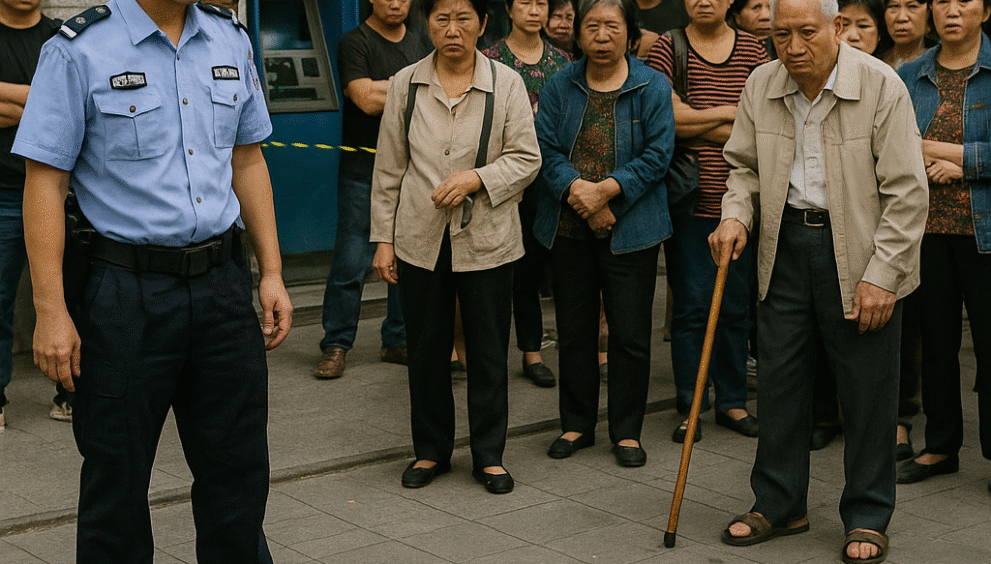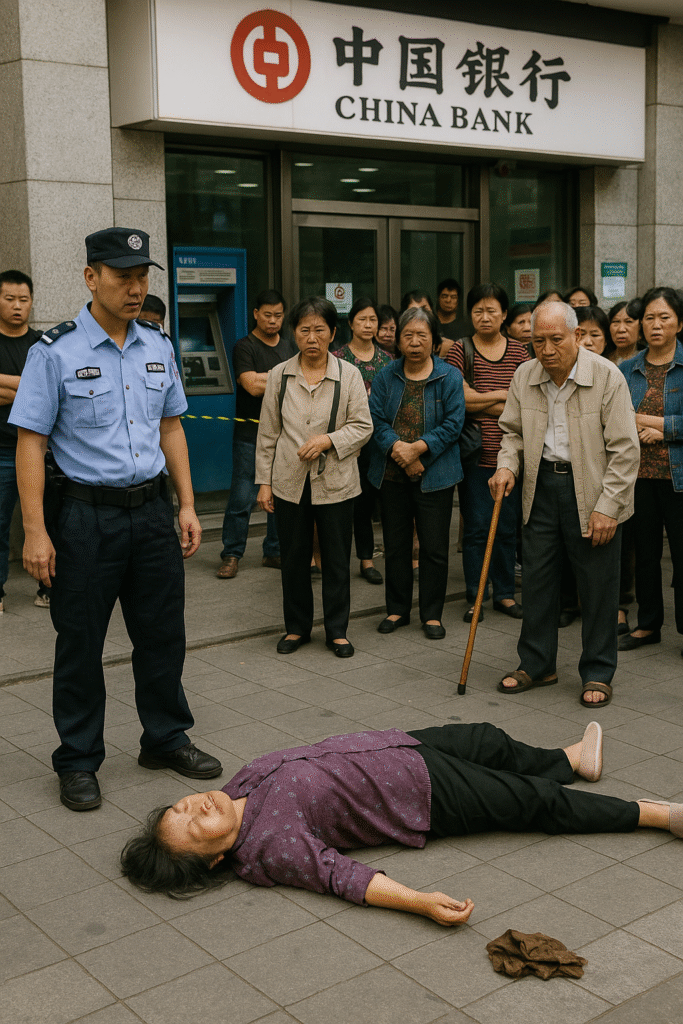Public Outrage Ensues After the Tragic Death of a Woman in China Who Died Outside of a Bank After Being Told to Make an In-Person Withdrawal

Outrage and anger are growing over the senseless death that took place outside a Chinese bank. The horrific death of a woman who died outside of a Chinese bank, after reportedly being told she needed to withdraw funds from her account in person as instructed, has sparked outrage across the country, not only producing a wave of public anger and outrage but also prompting a rigorous and intense scrutiny of current banking policy, customer service practices, and treatment and care of vulnerable people in China.
The Incident That Shook the Nation
A middle-aged woman, also reported, tragically fainted and subsequently died outside the entrance to a state-owned bank after she was denied the option of withdrawing her money through proxy arrangement or any other electronic method. She was instead informed that she would have to visit the bank branch in person to have her identity verified. Witnesses to the scene have indicated that she appeared to be under duress, if not even ill, as she waited outside for several hours before she collapsed without any prompt medical attention.
Criticism of Strict Banking Policies
China has been, in the long term, an excellent pioneer in the field of digital finance, with a number of developments and innovations in the field. The specific incident, however, serves to underscore and bring to light the limitations and difficulties of digital banking services, particularly for those who are technologically not very savvy or are suffering from a number of medical conditions that hinder their capability to use these services to the best of their ability. Detractors of the system contend the need for in-person transactions is contrary to the country’s overall efforts and initiatives towards increased technological integration in the financial system.
Banks in the Dock for Failing to Look After Elderly and Vulnerable Customers
The tragic death of the woman has brought with it fierce arguments and discussions again regarding how the banks ought to be treating elderly individuals, the disabled, or those who are mobility-impaired. There are quite a few users who have resorted to different Chinese social media platforms, particularly Weibo, in order to post their own traumatic and painful experiences with the banking services, which has resulted in the creation of hashtags like #BankWithdrawalDeath, which have been trending for hours already as the public continues to discuss the topic.
Public Outcry and Social Media Explosion
After the incident, netizens posted a flurry of messages calling for justice and institutional reform. The most viralled post attracted more than 5 million shares within less than 24 hours with users tagging financial institutions and local government institutions.
Pressure on Banking Institutions
Social media users are actively calling for open investigations to be carried out, and calling for disciplinary action against responsible staff. They are also calling for new policies to be formulated to offer remote or assisted banking services to those who have legitimate medical or personal constraints that would make such services essential.
Legal and Ethical Implications of the Incident
Legal scholars are raising the prospect that the bank could be hit with huge wrongful death claims or even serious charges of gross negligence. According to the provisions outlined by Chinese law, yes, it is very much possible that organizations be held accountable if their actions, or in this particular instance, their inactions, result in a disastrous loss of life. But the enforcement of a direct causal link between the bank’s inaction and the resultant loss, and the evidence of intent, could be an uphill task.
Ethical Responsibilities in Financial Services
This unfortunate tragedy has raised a serious question regarding the public responsiveness and moral responsibilities of banks to the general public. Banks are not mere commercial institutions focused on making profits; they are also guardians of the public trust that they must maintain. When a bank denies assistance to someone who is clearly in obvious distress, particularly after a phase of strict policy adherence, it indicates a much greater and serious institutional failure in the system.
Methods of Identification in the Past
An overwhelming majority of critics point out that not only is the bank’s insistence on face-to-face authentication outdated, it is also potentially unsafe, particularly in the light of post-pandemic societies. In modern times, distance services have grown from a luxury to a minimum essential requirement of the masses.
Requirement for Emergency Procedures Experts are highlighting the glaring absence of comprehensive emergency response protocols in most banks across China. CCTV has been said to record the horror-struck sight of the woman in line with no one providing her with any aid. Sadly, the security personnel and staff did not intervene and provide the required aid until it was much too late—a harrowing reminder of the repercussions that follow when humanity is compromised in the name of strict compliance with procedure.
Human-Centered Banking Efforts
In response to the adverse feedback that has been witnessed, a large number of civic groups and advocacy groups are now calling on banks to implement what they refer to as “human-first banking procedures.” The procedures would see frontline employees being given extensive training that encompasses such fundamental skills as basic first aid, quality customer service, and increased sensitivity awareness in an effort to better serve their customers.
Expansion of Proxy and Online Services
Activists are urgently calling for legislative changes that would enable authorized caregivers or relatives to make transactions on behalf of account holders with unstable health conditions. This would be conditional on the provision of proper authorization to make the process legitimate and secure.
Government Accountability and Oversight
Citizens are calling for a tougher and more effective government regulation of banking institutions following recent events. Several people claim that this specific incident points to deeper and more pervasive issues of bureaucratic lethargy and ineffective regulatory mechanisms, which disproportionately impact those who are at the fringes of society.
A Reflection of Institutional Apathy
While this specific event took place at only one of the institution’s offices, it has struck a responsive chord and has become a symbol of a collective sense of indignation throughout the entire country about the manner in which many institutions tend to place a tremendous value on rigid adherence to procedures at the expense of a decent treatment of human beings. A single woman’s death has become a clarion call with great resonance that speaks to millions of individuals who are now desperately screaming for the inherent values of dignity, respect, and the requisite flexibility from the very systems that have been created and established to meet their needs and safeguard their rights.
Civic Mobilization and the Power of Public Pressure
This significant development clearly underscores the ascendant and unstoppable power of civic mobilization in the midst of modern China. Through a range of activities from hashtags used on social media to street demonstrations, citizens are effectively utilizing all avenues available to them to call for humane treatment and institutional reform. This development is a sure and even unmistakable sign that public endurance of the current conditions is thinning, indicating increasing urgency among the populace.
Conclusion:
A Moment That Must Spark Change The unfortunate and tragic death that happened close to a bank cannot be brushed aside as an isolated or singular event that does not carry any other weight or significance. It is, rather, an indicator of the deeply entrenched systemic failures that prevail in a number of public policy, quality of customer service, and public health priorities domains. In consideration of this incident, the general demand for justice, accountability, and human policies must be responded to not with silence and inactivity, but with a will for effective and meaningful reform that can be a force for good. This is a solemn moment that demands not just intense grief and introspection, but also immediate and transformative action to be taken. It is urgent and essential that banks and other financial institutions throughout China and even outside of it take this tragic event as a rude wake-up call, and initiate the necessary process of redefining and recasting their procedures and protocols to ensure that they place and prioritize human dignity in every interaction that they have with customers and clients.

 English
English 




















